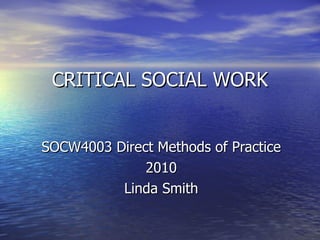Recommended
Recognition Struggles and Process Theories of Social Movements - Carol Mueller

Recognition Struggles and Process Theories of Social Movements - Carol MuellerMarcos Eduardo Villa Corrales
Recommended
Recognition Struggles and Process Theories of Social Movements - Carol Mueller

Recognition Struggles and Process Theories of Social Movements - Carol MuellerMarcos Eduardo Villa Corrales
More Related Content
What's hot
What's hot (20)
Critical theory to study in and out school context

Critical theory to study in and out school context
Similar to Critical Sem 1
Similar to Critical Sem 1 (20)
1 S o c i a l T h e o r i e s Social Theories .docx

1 S o c i a l T h e o r i e s Social Theories .docx
1 S o c i a l T h e o r i e s Social Theories .docx

1 S o c i a l T h e o r i e s Social Theories .docx
Critical Sem 1
- 1. CRITICAL SOCIAL WORK SOCW4003 Direct Methods of Practice 2010 Linda Smith
- 3. Introduction to critical thinking (Garvin and Seabury, 1997:44) * critical thinking around various constructs * lack of attention to differences, oppression * social group membership: age, race, sexual orientation, ethnicity, gender, race, social class, disability * ‘the other’ and ourselves * problems arise - absence attention to this knowledge * power differences, discrimination, transformative work * group membership, how reinforced/denigrated - social, political historical contexts * therapeutic experiences harmful if not culturally compatible or reinforce power imbalances * positionality (group identities, experiences) + standpoint (outsider/insider status) influence expectations + development of critical consciousness
- 5. Critical consciousness “ process of continuous self-reflection coupled with action to discover and uncover how we, our approaches to social work practice and our environment have been and continue to be shaped by societal assumptions and power dynamics” (Garvin and Seabury, 1997:46)
- 13. Reflexive-therapeutic view (therapeutic helping) Individualist-reformist Socialist-collectivist (maintenance or social order) (emancipatory/transformational)
- 14. FRAMEWORKS FOR ANALYSING THEORIES Theories of radical change Radical SW Marxist SW ‘ consciousness raisers’ ‘revolutionaries’ Subjective Objective Interactionist Traditional SW ‘ seekers after meaning’ ‘fixers’ Theories of regulation
- 18. DISCUSSION EXERCISE: FOUR SUPPOSITIONS OF THE CRITICAL SOCIAL SCIENCE PARADIGM Macro-social structures shape social relations at every level of life The world is divided between ‘haves’ and ‘have-nots’ and the interests of these groups are opposed and irreconcilable The oppressed are complicit in their oppression Its emphasis is on empowering oppressed people to act, collectively, to achieve social change
